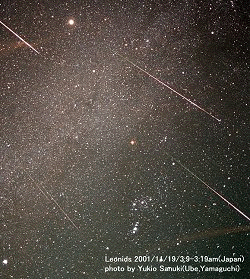
 |
|
| ||||||
|
OPINION Fact or Faith By Michael MacIsaac, Inverness Academy, Inverness, NS Today's world is crammed with quite the sufficient number of dilemmas. Being a teenager trying to uncover the right path through this world, you really begin to ponder about the living and breathing problem child that some people have morphed our planet into. Mind you, things such as the War on Terrorism and the Kyoto Accord got the attention and international support that they deserved, but could things such as the War on Terrorism have been prevented rather easily? Don't you think that Iraq looks at George W. Bush the same way that North America looks at Saddam Hussein? It's not really my place yet to get involved with such world-revolting matters as these, but what I'm trying to say is that our views of the world are biased. We live like restrained sheep; taking orders from the head dog and being sheltered within the ways of our own continent. We listen to CNN, we make comments at the dinner table, and then we are fuming for the rest of the week that the President or Prime Minister is not doing what we would do if we were in their shoes. What's the problem with this? There are none! At least not if our views and our words were constructive. They're not. Why aren't they? Simply because we're getting the good guy side of the story without giving so much as an insignificant supposition as to what the other side of the story tells. CNN sometimes is nothing but a United States propaganda tool. As if the shock of 9/11 wasn't enough for a country to try and deal with at once, life struck the world with another blow as Columbia attempted to safely land back home once more some time ago. The spaceship proceeded to disintegrate into space, trapping all lives inside and taking them to somewhere better off than here. No one could take the shock and standstill disbelief away from witnessing this moment on television. Someone had a grudge against planet earth. Without further a wait, I shall present both of sides of the story and let you be the judge, jury, and executioner. What's in store for today? Whether or not the funding for the space program should be, after Columbia, more, less, or if it should even exist at all.
Take for example again the year 2000. The total federal budget was beyond comprehension at two trillion dollars American. If you want to see it in numbers, it's $2,000,000,000,000,000. Collected taxes from all taxpayers accounted for nine hundred billion dollars of that budget, or $900,000,000,000. Now here comes the controversy. Of that nine hundred billion dollars collected from taxes, two billion dollars went to NASA. To any average Joe, two billion dollars would definitely spell E-A-R-L-Y R-E-T-I-R-E-M-E-N-T, but when you're constructing the most powerful machines on earth, two billion dollars just might get you enough fuel for the year. Try that for rising gas prices! For every one thousand dollars, all of sixty-six cents will end up in NASA's wallet. Not enough? What about too much? Here's where you decide. * * * Well for starters, what are they looking for up there? Deep into space, they're looking for supernovas, black holes, neutron stars, planets, asteroids, and meteors that could potentially destroy the planet among many other things. These kind of clues as to when the universe was created. You may shout, "Who cares? It could have been created yesterday for all I care! I'm here, life's decent, let's enjoy the present while we have it! Think about it! That view makes perfect sense. We've evolved into what we currently are today, so let us enjoy that. We don't need to focus so dearly on what we cannot control. Yet for the curious souls of this world, space exploration may detect the needle they've been searching for in the once infinite haystack. "Why are we here? How'd we get here? What makes us control the souls that we do? Really how lucky were we to be exactly where we are in the universe with the exact conditions for life, and the exact distance from a star to support life?" Without the universe, none of us would even be here. Does it hurt to give it a little attention? For the doers of the earth, the space program is as useless as a Boston cream donut without the cream. For the earth's dreamers, it does them justice by satisfying their need to answer longing questions, and all questions deserve to be addressed. No question is a stupid question! And say we do discover supernovas, black holes, neutron stars, and all this stuff. They're countless miles away anyway! They are trillions upon trillions of miles from earth, which is nuts. It's not as if we can lasso them closer to earth and inspect them! First and foremost, the universe is basically eye candy. We're paying trillions of dollars for eye candy that we could see for free by means of a sunset or just a starry sky. Why fund such a program? You don't like the doers thoughts? Or do you? Well take a look at the dreamer's argument, and that may or may not solidify or alter your train of thought. This is more than eye candy. Even if we do discover a phenomenon too far away to be personally explored, we can do basic research from the earth's surface, extensive research with our machines, and we can marvel at what the universe offers us every day. The knowledge that something so incredible is sharing this universe with us is beyond satisfying. To be able to say, "I've seen things in life that so many men and women never will," would and does make a life worth living. Such a program brings a feeling of success in life on such an awesome level. Another factor is that astronomy is just how interested and qualified people make their livings. Astronomers don't live their lives dreaming about raising Lord Stanley's Cup or becoming President or Prime Minister. They live their lives dreaming of having a man on Mars or creating a groundbreaking technical machine that can travel to the depths of the universe and find new life. They pursue a career that interests them just the same as athletes, teachers, and doctors, and everyone else does. This is what intrigues them in life, what sparks their desire to live. If this is how they opt to make their living, who are we to discourage that? In reply to that, a very interesting point can be made and has already been brought up in the world. If these men are the foundation of Mensa, shouldn't they have the ability to change careers to something for the good of the people? They could accomplish things with their funding and smarts such as finding a cure for cancer instead of discovering the atmospheric pressure of a planet too distant to care. Maybe. Yet don't forget that astronomy is for the good of a select group of people. It is for the good of dreamers, stargazers, and people who take the time to look up in awe. Could the dreamers be forgotten about, though? I'm sure dreamers wouldn't mind a cure for cancer because we all suffer from the disease in some direct or indirect way. Although, how would you feel if your dreams were crushed? And who's to say that space cannot have medical benefits? One of the reasons space is being explored is for possible medical breakthroughs. They don't bring animals into space to test intergalactic cyber food! It's for the soul purpose of analyzing their reactions in the universe outside of earth. What does this have to do with human health? Well if one person is near-death and is willing to try the extreme in an order to be cured, there is no harm in rocketing them into space and hoping for a positive reaction, as possibly demonstrated in the film Contact. What if getting patients into space is too risky and too costly of a deal? And what if it doesn't work? Well patients on earth find means to fund their health, and they all face the same dilemma with new drugs that have yet to be tested. And who's to say that some universal material doesn't hold the cures to the most devastating diseases? Some people believe it's just too impossible and some people believe that the impossible is only something that no one's ever done before. Without funding, how will we on earth ever know if space holds more answers to questions than dreamers ask? What if we fund it and all these cures just aren't out there? You can say that we should shoot for the moon because even if we miss, we'll land among the stars, but landing among the stars means wasting trillions of valuable dollars. Is it worth the risk? Say that health's problems are actually answered by space and say that the dreamers' questions are examined and even answered. Are the answers worth the risk of not losing just money, but human life? Well that depends. If you're a doer, then chances are you're on the side that's thinking,"We have just one short life to make good of, so why end it prematurely?" And really, why does anyone want to die early? It makes sense. We've got one life to live, albeit short, that we have to enjoy. Don't end it before you have to! Now on the other hand, if you're a dreamer, you've probably got this train of thought motoring throughout your mind: "If you believe in the unbelievable, and death is the only means of making the world believe in what I do, then it's a small cost and one worth taking." Do you think that a premature death, purely on the chance that something out there might answer some questions, is worth the funding? We all do owe a death from the moment we are born, anyway. Is death worthy of funding? That may not be how you think of it, but in some cases it comes down to human life. We all have examples of this. Would you fund the possibility of a premature death for something you believe in or not? All astronauts appreciate and cherish yet know the true dangers of space travel. Oh, the glory of a debate!
However, do we care? So what if other people live out there! It's not like we can be their pen pals. We certainly cannot reach out to them and befriend them or know if we could communicate with them by any means. They could be bacteria, not necessarily intelligent life. Is it worth more trillions of dollars just to hope and guess that there are beings so far away that we'll never see them for as long as time exists? Maybe funding for the space program is all one huge crock. Why do the dreamers of the world want to find out so desperately? Well for one, there is the actual possibility that somewhere in the infinite universe that there may be beings like us living in civilizations like us, maybe even wondering themselves if life is out there. We owe it to ourselves to find out and to be able to put the issue at rest. To be able to have at least mathematical contact with other intelligent life would simply be crazy! To have contact with other beings in the universe on any grounds would be absolutely mind-boggling. You see, most people seem to forget the fact that we really are in the universe, out in space. We don't live in metropolitan cities or small villages; we live on an amazingly small pebble in an infinite black world whipping around a ball of fire every three-hundred sixty-five days. Our neighbours are not he people living in the closest house! Our neighbours are millions upon millions of miles and light years away and come in the form of other planets, stars, and galaxies. We owe it to ourselves to visit our neighbours. All right, so let's hypothesize. Even if we fund the search for intelligent life and even if we succeed in finding other intelligent life, we're just supposed to spend billions upon billions upon even more billions of dollars just so we're able to say, "Yea, there's life out there." It seems like quite a few billions of dollars will have to be spent on this statement! I'd rather be able to say, "Yea, there are twice as many hospitals and schools," or, "Yea, we've found a better alternative to pavement." The life either is or isn't there, so let's just go on what we already know and take a fifty-fifty chance guess on it instead of a billion dollar investigation. We already know that the universe doesn't end so the chances of finding life that has some brains is just that: infinite. There are too many things going against this to throw in billions of dollars on the table and then spin the wheel for a double zero. Is faith stronger than fact? Or is truth the stronger power? You tell me.
Let me first grace you with a little nonfiction story that pitted Galileo against the Catholic church. In Galileo's lifetime, the church was basically the King, if you will. What they stated was how things were meant to be. They stated that the solar system is actually geocentric when, as we know, it is obviously heliocentric. Galileo was the one man who challenged biblical cosmology. Galileo's faith that the simpler mathematical model should be preferred stood correct as Galileo's heliocentric model was much more clearer and simplistic. However, when it became known that Galileo was teaching his heliocentric model, the church put him on trial. He was found guilty and was sentenced to a life of house arrest. This is one occasion where the church and the Holy Bible were one hundred percent wrong. They failed to admit it. This begs the question: If the Bible tried to believe in the incorrect before, are they still believing in the incorrect today? Well, let's see where you stand. Do you believe in things being invisible? If you don't, then I can certainly say that your belief is scientifically wrong. For one, black holes are invisible but they are definitely there. However, who says science is right? Aren't new things being proven all the time? This must mean that science is a bunch of questions and not answers. This begs another question: Do you believe in God? If you do believe, then why? We can't see him! If you don't believe in the invisible but you believe in God, isn't God invisible? Science proves how earth was created, or so we think, but do Roman Catholics not still believe that God created earth? Can we prove there's a heaven? Of course not, we're not dead yet. We can't literally have conversations with the dead and ask someone dead to cure us of sins. Or can we? I'm wandering a bit off-topic here, but for a good reason. There are indeed people who believe they can open up a passageway with the deceased to communicate with them. Are they wrong? Maybe. We can't see the dead communicate, so is it all about faith? What I'm getting at is, do you need to see it to believe it? Do you need proof that something exists or is it really faith that is our strongest force? Is science right or wrong if they can or cannot prove something? Is religion right or wrong if they do or do not have a belief in the same theories? Think you have your mind made? Well wait just one second. A little while back, a bone box was discovered that is believed to have within it the skeletion of Jesus' brother James. It may even be a hoax or a different James, brother of Jesus, Son of Joseph since those names were very common back then. There may be strong evidence that Jesus walked this earth; that he did exist. Hold up! Is it possible for a woman to become pregnant without intercourse? Isn't this how Jesus was born? Fact or faith; it's all your decision. Who's right? Astronomy or religion? Fact or faith? Science is the search for truth. And doer or dreamer, has the thought ever entered your mind that what religion is saying is incorrect? Or is it science that is interfering with those of Catholic beliefs? Can the two ever agree? Well at least one thing can be made sure. As long as religion and science continue to be in conflict, there will be as many pushing for funding as there will be wishing death upon the space program. Where do you stand?
|
||||||
 Astronomy has indeed evolved into so much more than simply exploring the universe. Astronomy has also had its fair share of controversy. The first matter for debate is how much of
(take for example the United States, since the Columbia disaster occurred there) the federal budget actually makes its home in the pockets of NASA.
Astronomy has indeed evolved into so much more than simply exploring the universe. Astronomy has also had its fair share of controversy. The first matter for debate is how much of
(take for example the United States, since the Columbia disaster occurred there) the federal budget actually makes its home in the pockets of NASA.  One of, if not, THE ultimate reasons for space exploration is the longing question that humans always find themselves wondering about when looking into the night sky. Could there actually be life on one of those faint lights? Could another intelligent civilization be out there looking at the same sky that we are? Funding is necessary to truly find out.
One of, if not, THE ultimate reasons for space exploration is the longing question that humans always find themselves wondering about when looking into the night sky. Could there actually be life on one of those faint lights? Could another intelligent civilization be out there looking at the same sky that we are? Funding is necessary to truly find out.  However, if there were ever one lone obstacle in funding the space program, it would come in all of one form. That form is religion.
However, if there were ever one lone obstacle in funding the space program, it would come in all of one form. That form is religion.